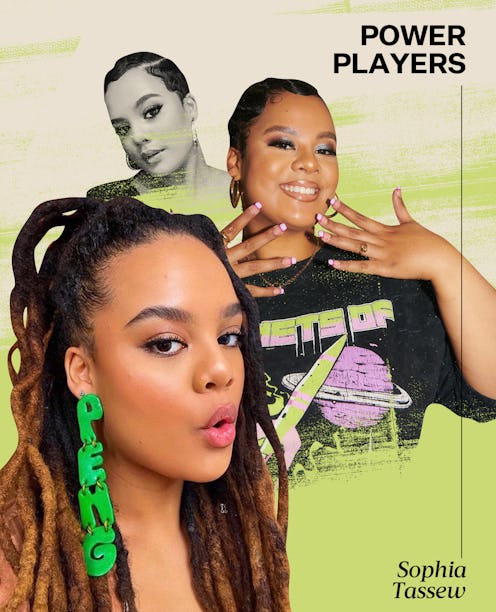Power Players
Sophia Tassew Wants Quality Clothing For Larger Bodies, Period
“Progress has been made, but it's not the radical progressiveness we need.”

Sophia Tassew is here to slay. The 25-year-old London-based designer, former model, and founder of jewellery brand Khula, went viral in January when she responded to a fatphobic tweet with an image of herself posing in the very Fabletics outfit. Her caption? A winning comeback: “I bought the dangerous outfit!!”
A true multi-hyphenate, Tassew has already established herself in a number of creative fields, taking on the worlds of design and writing to name just two, and doesn’t show any sign of stopping.
Not only does she advocate for bigger bodies in fashion, but she also pushes for this representation and inclusivity through her exhibitions, like RIOT!RIOT!RIOT! and 140 BPM. Her handmade earrings are worn and adored by the likes of Joy Crookes and Stephanie Yeboah. And she’s soon to become a published author. Part of a new Black British history series, A Quick Ting On Bamboo Earrings, which she described to The Guardian as “a love letter” to the women who raised her, “along with a nod to my culture.”
Though she’s put her modelling career on pause, Tassew still loves storytelling. “I’ve given up just being the face and body for a brand, but I still love storytelling and campaigns that have a real meaning behind them,” she tells me.
In “Power Players,” change makers in the fashion industry tell Bustle how they’re pushing boundaries and moving the culture forward, whether they’re advocating for sustainability, bringing more inclusivity to the runway, or making strides in technology and innovation. Here, designer Sophia Tassew discusses equality and inclusivity in the fashion industry, and how far we still have to go.
You've always been a fierce proponent of equality within the modelling and fashion industries, why is that important to you?
For me, it’s simple: equality should just be the standard, and that's it.
Over the past number of years, the dialogue is very much about sharing personal negative experiences and anecdotes, as it to prove myself or my worth. And I'm over it. We shouldn’t need to share all this negativity in order for the industry to see us as equal participants and treat us in the way we deserve.
How would you assess the state of equality in modelling and fashion?
Progress has been made, but it's not the radical progressiveness we need; we just want clothes for larger bodies that are well made and actually fit us. A lot of brands will dress their campaigns to seem inclusive, but clothes are still poorly made. Online, people find a sense of community in their shared disappointment, rather than finding comfort in our shared joy.
It’s why I put a pause on modelling, because I had so many bad experiences. I've had too many shoots where I’ve ended up crying in the toilet or sign a contract knowing it's going to be a negative experience. It really shouldn’t be that way.
Equality should just be the standard, and that's it. Simple as that.
How do you define power? And what does it look like to you?
I think it’s about speaking up for myself, regardless of how that comes across. I turn 25 this year, and almost quite suddenly, it hit me that I’m truly alive and that time is going by. I'm not gonna let that time go by whilst being uncomfortable.
Is there a specific time recently when you felt powerful?
The other day I went and got my nails done and got my favourite Starbucks. It doesn't seem big, but I think there's just something really powerful in doing what you love, when you want to. To anyone else, I was just drinking my coffee and looking at my nails, but I just felt so good, content, and so at peace. And when you're not really familiar with the feeling, you hold onto it with both hands.
I think there's just something really powerful in doing what you love, when you want to [do it].
What have been some of the most valuable lessons you’ve learned working in the industry?
To not compare yourself to others and how much of a massive waste of time it is. Comparison is truly the thief of joy.
How do you deal with negativity and not letting outside distractions interfere with your progress?
I always tell myself that negativity and distractions will happen regardless, which may be quite a negative way of looking at things, but it works for me. I can't remember the last time that I've let outside distractions impact on my progress, which is progress in itself.
What are your hopes for the future of modelling and fashion?
I would just love to go online and find a dress that fits me and that doesn't have seven holes in it. If you look at what people are asking for, it's simple things like sizing and quality. Things that could easily be fixed. And hopefully one day we can get to a place where everyone has these kinds of things and the industry is moving forward. Until then, the fight continues.
This interview has been edited and condensed.